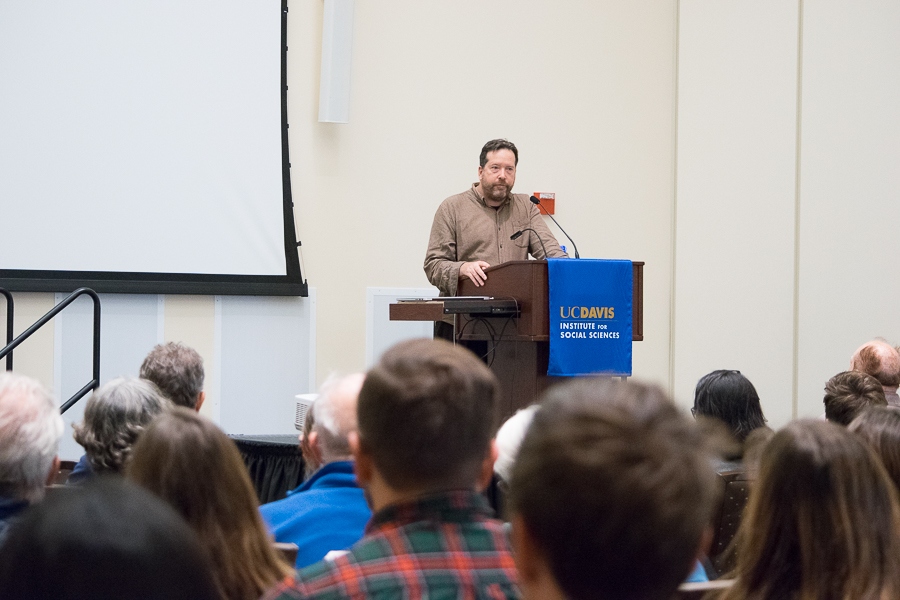
Institute for Social Sciences hosts Miller’s lecture, book signing
On Jan. 25, journalist Todd Miller visited UC Davis to speak about his most recent book, “Storming the Wall: Climate Change, Migration, and Homeland Security,” as a guest of the UC Davis Institute for Social Sciences. At the lecture, Miller described his travels for his book to communities around the world that have been harmed by climate change-induced phenomena.
“The book itself is what some have called reportage journalism, in the sense that there’s a lot of storytelling, but storytelling with woven analysis and data and statistics,” Miller said.
According to the event page website, Miller “has researched and written about border issues for more than 15 years, the last seven as an independent journalist and writer.” He currently resides in Tucson, Ariz. but has lived and worked in Oaxaca, Mexico.
Miller drew connections between these natural disasters and homeland security and border regimes, noting how both especially affect the socioeconomically disadvantaged. Miller urged the audience to understand that although this connection may not be especially apparent to many Americans, it is a harsh reality for citizens of many developing nations.
“I have set out to chronicle the way a massive system of social and economic exclusion militarizes divisions not only between the rich and the poor, but between the environmentally secure and the environmentally exposed,” Miller wrote in his book.
To learn more about how climate change, migration and homeland security are interconnected, Miller traveled to the Mexico-Guatemala border, the United States-Mexico border, the Philippines, Thailand and Central America. He also visited Paris in 2015 during the United Nations Climate Change Conference.
“When I would go to each place, I would try to interview as many people as I possibly could on the subject matter,” Miller said. “With every single possible person, I tried to be as thorough as possible, and I tried to get the most compelling stories.”
Miller recalled traveling to a coastal community in the Philippines that had been visibly ravaged by rising sea levels. He observed the shell of a home that had been destroyed by the ocean and was especially struck by two victims of the natural disaster, a father and his young son, who stood next to the ruins.
“I just watched the father and the child, and I looked at them, and that’s actually how ‘Storming the Wall’ opens,” Miller said. “I started thinking about that child because obviously the sea was going to affect that community.”
Miller said he spoke with countless victims of climate change, many of whom live in developing countries. Miller remembers talking to a victim of Typhoon Haiyan, which hit Southeast Asia in 2013, who recalled his near-death encounter with the hurricane in vivid detail.
“I asked him, ‘Can you describe what happened during Typhoon Haiyan?’” Miller said. “And he said, ‘Do you have eight hours? Because I remember every single horrific moment of it.’”
Rather than write solely about the survivors of climate change-induced natural disasters, Miller also examined how these survivors are displaced due to climate change. His research revealed that the number of displaced survivors is currently extremely high, and that it’s projected to increase even more in the near future. Miller also noted that there’s no climate refugee status that might allow these survivors to move to a safer or less affected country of residence.
“There’s no legal framework around climate refugees, neither in an international sense […] nor in any individual country, though New Zealand is the one possible exception,” Miller said. “If New Zealand were to do this [pass a law recognizing climate refugees], I think that would be the very first example of a country authoring some sort of climate refugee status.”
Miller pointed out that without this protection, refugees of natural disasters face barriers and regulations that they cannot resolve on their own.
“It’s more and more likely that they’re going to face militarized border regimes that are only increasing,” Miller said.
Near the end of his speech, Miller criticized America’s inaction with regard to supporting those who have been displaced by climate change-induced natural disasters. He called out the Trump administration’s vehement denial of the existence of climate change, stating that it was harming the movement to protect climate refugees.
“It’s worth taking a step backing and thinking about how Washington and climate change, particularly right now because the President is a renowned climate change denier,” Miller said. “There have been some really chilling effects.”
Miller said he is hopeful that the American political machine will shift in favor of protecting immigrants fleeing the effects of climate change.
“There [have] been many different people, organizations that I’ve met that are doing really incredible things,” Miller said. “And assume that even right here, even though I don’t know you, even many people are doing incredible things here in this audience.”
Written by: Jacqueline Moore — campus@theaggie.org



